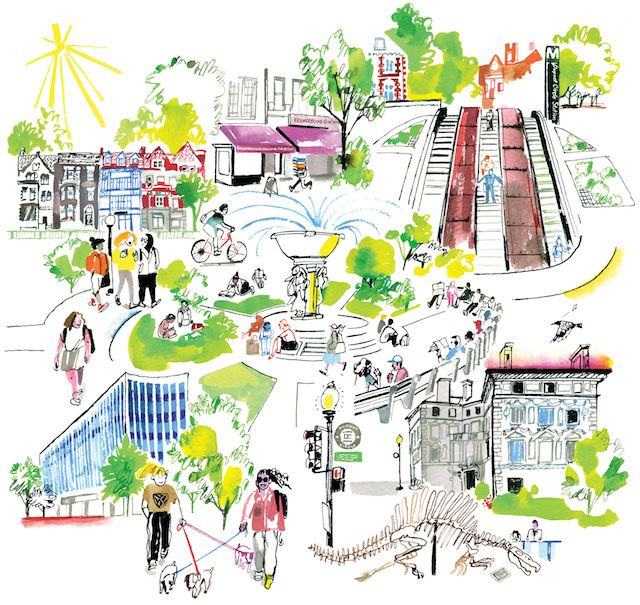
Footsteps clattering down marble corridors and shuffling across red carpets, Annette Barile is a long way from Winston-Salem and an even longer way from home. The junior education policy major grew up in Tokyo and Hong Kong. These days, she pops backstage at The John F. Kennedy Center for the Performing Arts or strolls by the National Symphony Orchestra’s rehearsal room on any old workday, operatic arias punctuating the labyrinthine walk to the cubicle where she interns four days a week.
Barile is one of 16 students living, working and learning together as part of Wake Washington’s inaugural fall 2017 “study abroad” class. The Wake Washington program immerses students during one semester in full-time internships — in Congress, think tanks, nonprofits and beyond — followed by rigorous Wake Forest courses in the evenings. The students I connected with in their fall semester commute by Metro from their Chinatown apartment building to VIP lectures, tours and visits. Cameos this past fall included former U.S. Secretary of State Madeleine Albright, conservative activist Grover Norquist and NBC News correspondent Andrea Mitchell, along with visits to the White House, Pentagon and Mount Vernon.
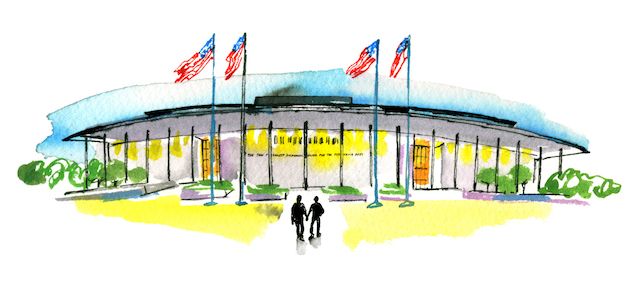
The academic program is housed at the gleaming new Wake Washington Center, a 4,300-square-foot space centrally located at 1 Dupont Circle, where students learn and network, alumni gather and connect, and Wake Forest has planted a gold and black flag firmly in the nation’s capital.
“We offer at Wake Forest this amazing core liberal arts education, and we’re using the world as a learning laboratory,” said Dean of the College Michele Gillespie at an open house for the Center. “D.C. is a crossroads of political and intellectual exchange — it really is powerful for us.”
WORKDAY HUSTLE
Barile, who created her own major, spends her days bringing arts education to underserved students across the country to help boost their academic success through the Turnaround Arts program. During school visits, Barile helped manage celebrity appearances by singer Paula Abdul and actor Elizabeth Banks, and she assisted during a video shoot with cellist Yo-Yo Ma. She captures multimedia content to keep the program’s website fresh, and she analyzes data from schools to help develop education programs. Barile is passionate about policy and works with a professional mentor from the National Parent Teacher Association, Director of Government Affairs Jacki Ball (’98). Between those opportunities and her constitutional law and policymaking classes with Politics and International Affairs Department Chair Katy Harriger, Barile is exactly where she wants to be. “The experience I’m having here is such a once-in-a-lifetime experience,” Barile said. “I’m growing so much as a person, I can already tell.”
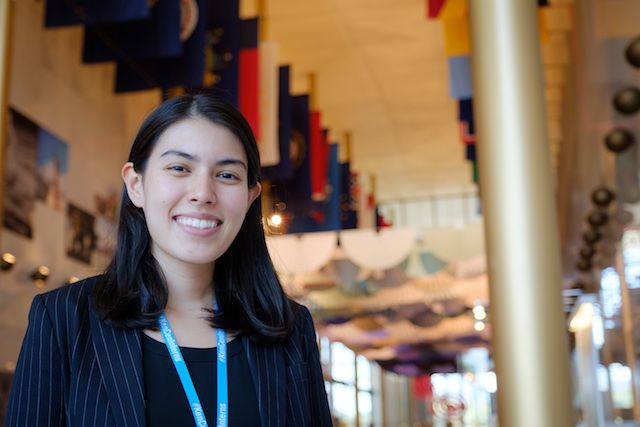
Annette Barile (’19) worked in Washington with the Turnaround Arts program for underserved students.
Her fellow Deacons are scattered across the city, each immersed in real-world work that matters. Like classmate Savannah Baber: the junior English and politics/international affairs double major is Native American, her mother from the Lumbee Tribe of North Carolina and her father from the Chickahominy Indian Tribe of Virginia. So her work for the U.S. Senate Committee on Indian Affairs exemplifies the lessons she took to heart as a child.
“My parents were very adamant about raising me in my culture with knowledge of my historical heritage and modern affairs — being a native woman in the 21st century and being able to navigate that identity,” Baber said. Today, she is working alongside other native people to negotiate relationships between tribal leaders and the U.S. government. Breathless with excitement, Baber says her semester with Wake Washington has surpassed every expectation. “I got here and thought, ‘Wow, all these people that are like me are doing this thing I want to do,’” she said. “It’s really nice to see myself represented in the office that I’m working in.”
"It's really wonderful for our students to see generations of Wake Foresters having amazing careers, the opportunity to have these alumni answer questions. ... What does it mean to take a wonderful liberal arts education and make sense of the world and find your place in the world?"
Mondays and Wednesdays, students grab dinner on the go, ordering Panera online mid-Metro ride or sharing Mexican takeout in the Wake Washington Center conference room before class with Harriger, faculty director of the Wake Washington program. They file in wearing blazers and toting briefcases or backpacks, the classroom enlivened by campus photos (including a wall-sized Wait Chapel), and dive into discussions seemingly ripped from the headlines.
Harriger says her course, American Constitutional Law: Separation of Powers and Federalism, “can be esoteric and arcane when you’re reading it back at Wake Forest. Here it’s just unfolding all around you,” such as the midsemester exploration of the jurisdiction of special prosecutors. “Every single topic,” she said, “I’ve been able to point to stories in the news.” To prepare for the class’ first U.S. Supreme Court simulation pitting President Donald J. Trump against international refugees, Baber says the class is referencing Twitter as much as Supreme Court precedent. The current political moment stokes lively-but-civil student debate and enriches engagement. This group of Wake Washington students, Harriger says, will ask her: “ ‘Dr. H, did you see what happened today with the Appointments Clause?’ That almost never happens on campus.”
Between working four days a week, evening classes and special activities on Fridays, the work-school-life juggle can be tougher at Wake Washington than back in Winston-Salem. “It’s been a good experience to get to understand why the real world operates on the schedule that it does and not the 2 a.m. college schedule,” said sophomore Jay Sherrill, an intern with the Subcommittee on Trade of the U.S. House of Representatives Ways and Means Committee. Sherrill and fellow students write weekly reflections on their job experiences, culminating in their 20-page research papers examining a topic related to their work; they’ll meet Harriger for office hours in the sleekly modern lobby of the apartment building they all share. A professional highlight for Sherrill was the front-row seat at a Ways and Means Committee hearing on tax and trade policy, where he met Chairman Kevin Brady, R-Texas, in an ornate Capitol meeting room.
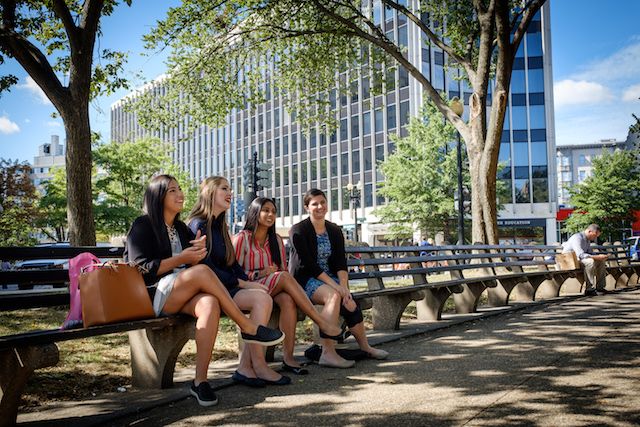
Students immersing themselves in the swirl of our nation’s capital for a “study abroad” semester find peak experiences through the Wake Washington Center.
City living is new to students like Kari Burgess, a junior English major from tiny Granite Falls, North Carolina, who interns for D.C. Councilmember Mary M. Cheh. Burgess spoke to me fresh from a tour of the Pentagon, where Vice Adm. C. Forrest Faison III (’80), Surgeon General of the U.S. Navy, spoke to students about public service and humanitarian aid.
Living in D.C., the cacophony of sirens and horns distracts Burgess both at night and during occasional protests during the day; her refuge is the National Gallery of Art’s peaceful courtyard of fountains and ferns. In spite of the bustle, Burgess loves “the flexibility of living in a city.” Most Wake Washington students have enthusiastically embraced D.C.’s love affair with brunch, and they pack in weekend visits to museums.
Barile welcomes the fast pace: “Those drastic changes in moving are what shapes you as a person,” she said. “I wouldn’t have it any other way.”
"The experience I'm having here is such a once-in-a-lifetime experience. I'm growing so much as a person, I can already tell."
DISTRICT, SO DEAR
Jennifer Richwine (’93), executive director of the Wake Washington Center, has attended to every Deacon detail to make Wake Washington students feel at home. D.C. alumni welcomed the group with a citywide scavenger hunt at their August arrival, hitting monuments and giving everyone their public transportation sea legs. Alumni and parents have delivered hot suppers to Dupont Circle, broken bread together in rooftop apartments, secured internship opportunities and volunteered as professional mentors. Trustee Al Hunt (’65, LITD ’91, P ’11), Bloomberg columnist and former Washington bureau chief for The Wall Street Journal, arranged for a parade of bold-faced names to visit the Center and speak to Wake Washington students.
“My goal all along has been that this is a bridge going back to campus — both ways,” Richwine said.
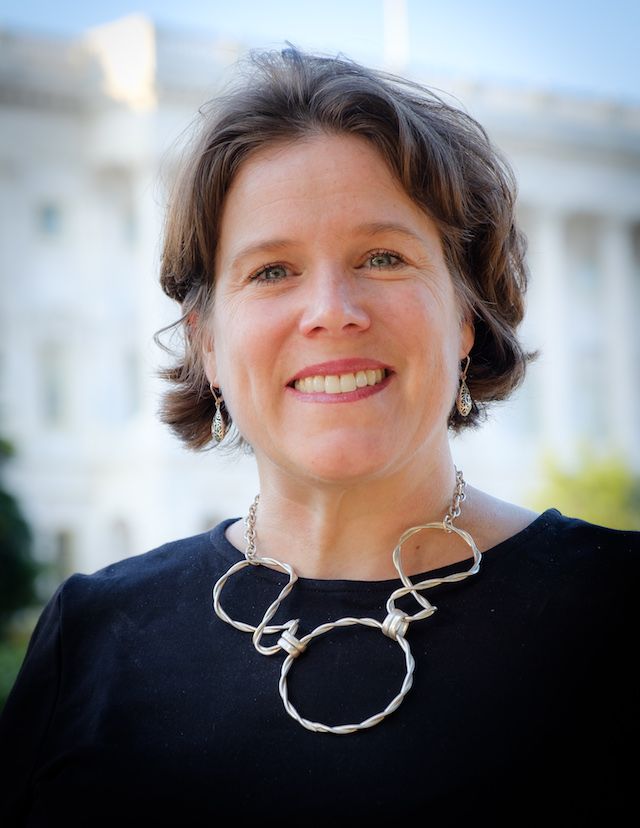
Jennifer Richwine (’93) attends to every detail to create a welcoming place as executive director of the Wake Washington Center.
The Center officially opened its doors with a bang, feted at an evening reception last October at the Newseum. President Nathan O. Hatch told alumni and friends mingling on the balcony along Pennsylvania Avenue that in Washington, D.C., “important conversations take place, important decisions are made. … There is room to make a difference. It is here Wake Foresters need to be.” An enormous screen featured images of the Center and its supporters, and the #WakeWashington hashtag was born. District luminaries — from Mayor Muriel Bowser to the Racing Presidents baseball mascots at Nationals Park — offered video greetings welcoming the University to the nation’s capital. And former Maryland Congresswoman Donna Edwards (’80) addressed the crowd, describing the Center as “a place for all of us who love Wake Forest to gather and support one another.”
One of the first such gatherings was the Center’s open house, a cozy affair complete with Demon Deacon cornhole. University caterers served up Southern-flavored campus favorites, including pimento cheese sandwiches, Cheerwine chocolate truffles, black and gold trail mix and, of course, Arnold Palmers.
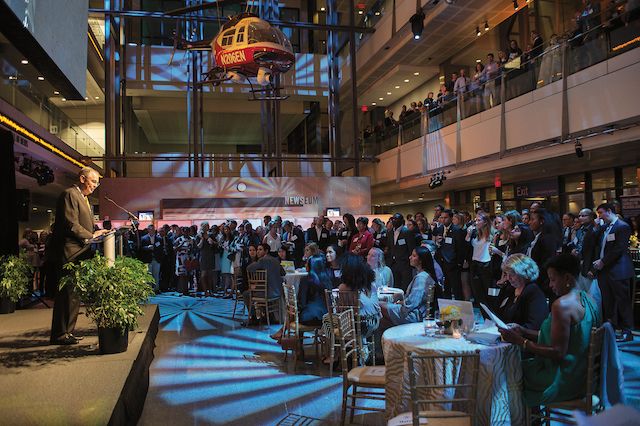
President Nathan Hatch, left, marked the Center’s official opening with remarks at the Newseum: D.C. “is where Wake Foresters need to be.”
“HOW DO WE TAP INTO THIS EXCEPTIONAL ALUMNI BASE?”
The celebration this past fall of Wake Forest’s new Washington home was a party decades in the making. There has long been a critical mass of Wake Forest graduates and prospective students in the Washington area, accomplished professionals settled here and newcomers looking to break in. Today, alumni in and around D.C. number more than 8,000. The city is “undeniably a hub of activity to Wake,” said Jonathan Willingham (’03), president of the Wake Washington Alumni Community. “We have all this activity in a place, but there hasn’t been a great focal point for that.”
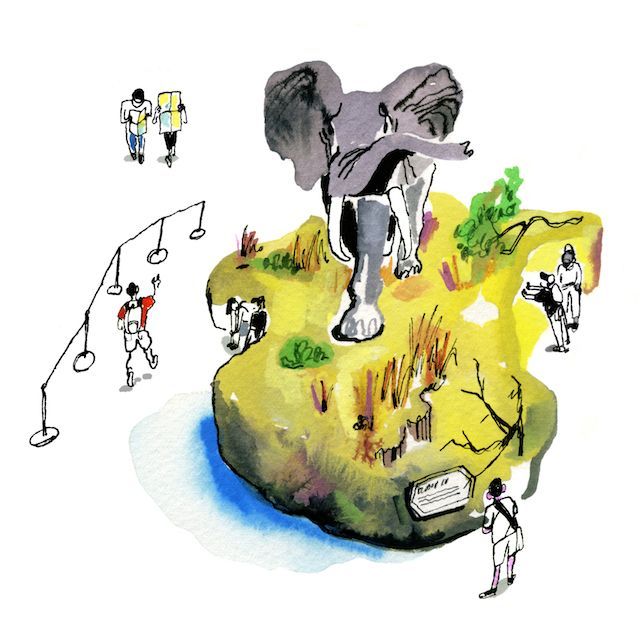
University leaders recognized untapped potential in the region, and collaboration across departments, including the Center for Global Programs and Studies, the Office of Personal and Career Development, and University Advancement, helped blaze the trail up Interstate 95. The University previously worked with The Washington Center, a nonprofit that connects students with D.C. internships and relevant coursework, but wanted to broaden its reach.
The Wake Forest study abroad approach “pioneers a kind of learning that brings the ivory tower together with the real world,” Gillespie said. In Washington, “it’s really wonderful for our students to see generations of Wake Foresters having amazing careers, the opportunity to have these alumni answer questions. … What does it mean to take a wonderful liberal arts education and make sense of the world and find your place in the world?”
"There's not a better time in Washington for WFU to provide a pipeline of people who know how to think ... Who really know how to bring people from disparate groups together for a common cause."
Richwine moved to Washington more than two years ago, serving as an adviser and University liaison to the Wake Washington Alumni Community and scouting potential sites for a University center. Philip Rogers (’05), vice president and chief of staff of the American Council on Education (ACE), was instrumental in helping the University secure the space at the instantly recognizable address 1 Dupont Circle, home to ACE, the NCAA government relations office and a number of major higher education associations. Former Parents’ Council member Robert Shue (P ’13, ’17) was an invaluable real estate resource, Richwine said. And she has scoured her formidable Deacon Rolodex to connect students with alumni mentors in their chosen fields and assemble alumni panels on policy topics.
Harriger and fellow committee members laid the groundwork for the academic program, envisioning its structure in the model of a Wake Forest study abroad house to ensure a rich experience. “It’s a great opportunity for lots of liberal arts students,” she said. “History, communications, art, all places you can see easy connections to (Washington.) She has recruited students and lined up professors for coming semesters. Professor of Communication Allan Louden led students in spring 2018, with Professor of Art and Department Chair Bernadine Barnes scheduled for fall and Politics and International Affairs Associate Teaching Professor Tom Brister for next spring. As faculty director of the Wake Washington program, Harriger will visit Washington regularly to advise future cohorts of students on their internships and accompanying research.
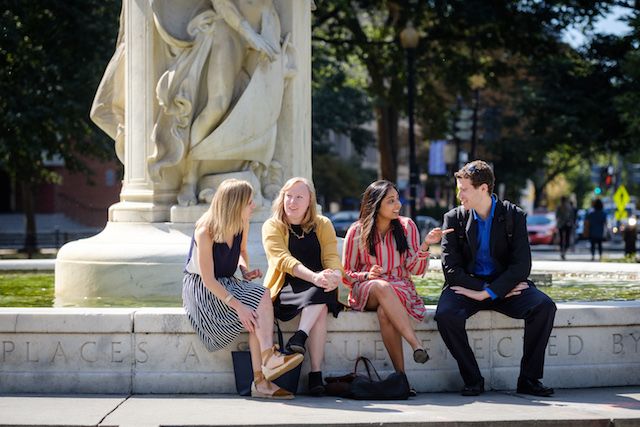
From left, Sarah Wakeman (’18), Emily Beeland (’19), Sanaa Jain (’19) and Larry Brett (’19) studied in the fall 2017 Wake Washington program.
While the Wake Washington academic program is the centerpiece of the new site, the Dupont Circle dance card has been full from Day One: Emily Herring Wilson (MA ’62) and Provost Emeritus Ed Wilson (’43) visited for a book-signing; the Association of Wake Forest University Black Alumni hosted a reception; Harriger has taught occasional evening politics classes to alumni; and the Lovefeast was livestreamed. During the spring and this summer, University law students are using the Center during judicial externships.
“The physical space itself will be transformative,” alumnus Willingham said.
The Center is equipped with high-tech classrooms and conference rooms to host video alumni panels for job seekers back on campus, networking sessions for recent grads, large receptions, space for faculty researchers and alumni gatherings big and small. Richwine oversaw the transformation of the facility from fluorescently lit cubicles carved up by walls to a bright, airy hub filled with light and possibility.
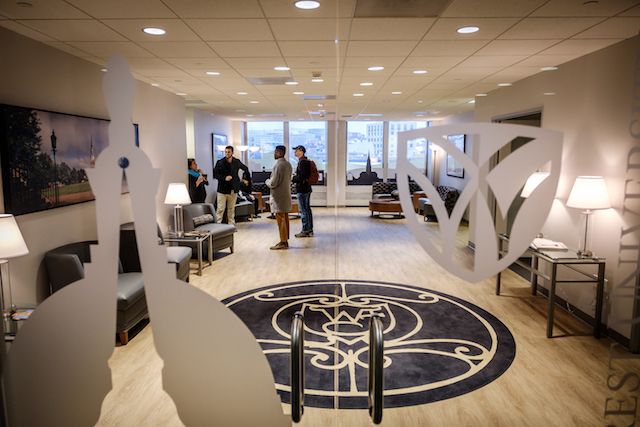
Above, the lobby of the Wake Washington Center serves as the hub for alumni and students. Below, Katy Harriger, left, Politics and International Affairs Department Chair, helped lay the groundwork for the Wake Washington academic program.
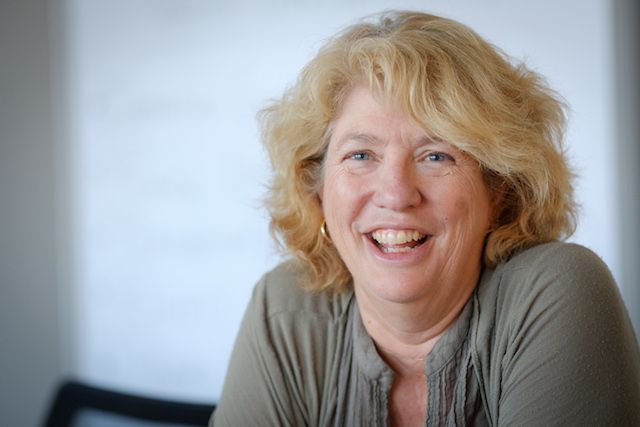
“There’s not a better time in Washington for WFU to provide a pipeline of people who know how to think … who really know how to bring people from disparate groups together for a common cause,” Richwine said. “It’s Pro Humanitate in just the right place, in just the right time.” True to the Pro Humanitate spirit, Wake Washington students and alumni came together in November to make peanut butter and jelly sandwiches for Martha’s Table, a D.C.-area nonprofit that provides education services, healthy food and emergency assistance to families in need.
Now that the Wake Washington Center is up and running, Gillespie says the University is looking farther afield, considering the possibility of a similar academic internship program based in Silicon Valley, to be called Wake West. “The same values baked into our undergraduate education at our College, we’re taking them to these academic programs in other places,” Gillespie said. “What we do is rigorous, academically excellent, and it helps the student see how the world works.”
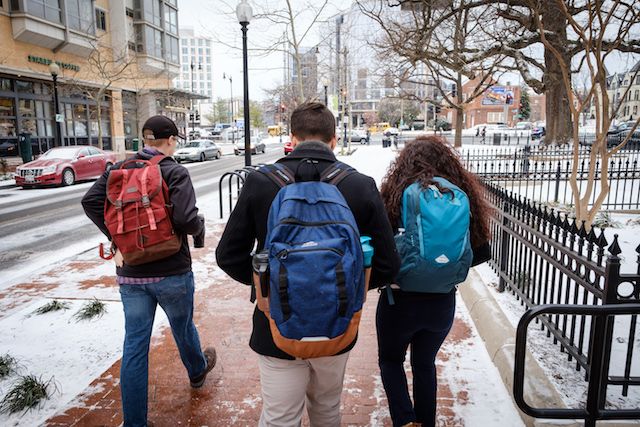
From left, Nikko Martins (’20), Christian Ricci (’20) and Tiffany Nunez (’20) started their spring 2018 semester in snowy D.C.
REAL WORLD LEARNING
Savannah Baber’s lesson in the workings of the world was nothing short of inspirational. Throughout the semester, she dedicated her time in the Capitol to gaining federal recognition for a number of Native American tribes, including her father’s. A bill that had languished in Congress for nearly two decades passed in January, recognizing six Virginia tribes as sovereign nations. It was her family’s dream come true. “I get to see this day as the ultimate culmination of my semester in D.C.,” Baber said. “Wake Washington will always be with me.”
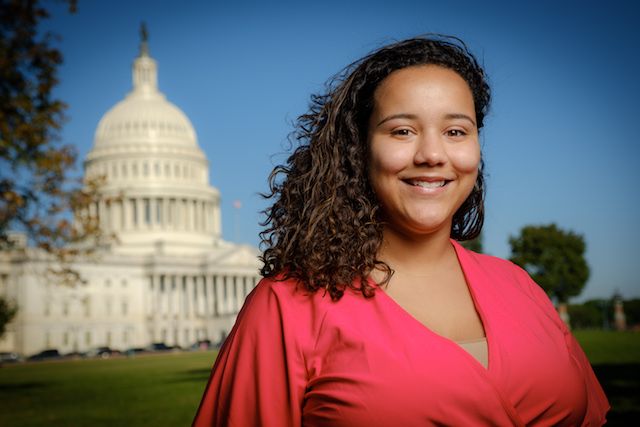
Savannah Baber (‘19) in early May became the University’s first recipient of a Udall Scholarship from the Morris and Stewart Udall Foundation. The scholarships, established in 1992 by Congress, went to 50 sophomores and juniors nationally this year for leadership, public service and commitment to issues related to Native American nations or the environment. Each student receives up to $7,000.
Back in the Kennedy Center, Barile sits in a cinderblock rehearsal room with mirrored walls, ballet barres, acoustic ceiling panels and a grand piano shoved in the corner. Out a window, the Washington Monument pokes above D.C.’s low-slung skyline. She and two dozen or so Kennedy Center interns are refining their pitches for arts outreach programs, critiquing one another’s analyses and designs. Soon, they will present their ideas — one group proposing expanded literary and poetry programming, another the creation of a new Kennedy Center app, among others — to senior executives for a “Shark Tank”-style evaluation. Top proposals have the potential to be developed by Kennedy Center staff.
“Learning in the classroom is great, but learning in the real world, where you’re really involved in high stakes work, is even better,” said Sydney Krieck, the Kennedy Center internship and fellowship coordinator leading Barile’s program.
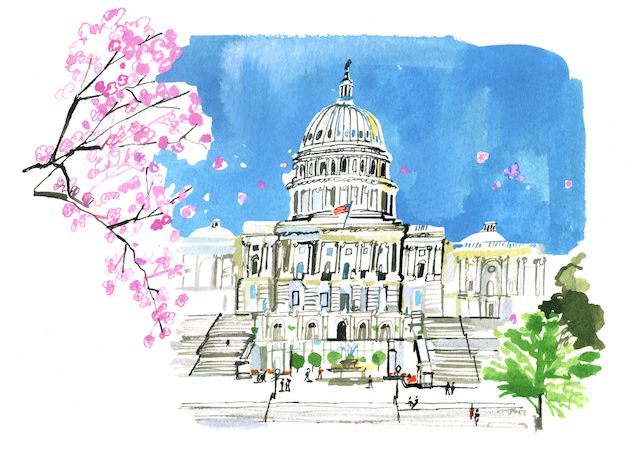
"It's a great opportunity for lots of liberal arts students. History, communications, art, all places you can see easy connections to (Washington.)" – Katy Harrigar
Workdays at the iconic space are filled with colorful surprises: Barile’s desk sits above the “Book of Mormon” rehearsal space, and she eats lunch at wooden picnic tables on the terrace overlooking the Potomac River and Lincoln Memorial.
“You never know what kind of things are happening with the Kennedy Center, which is really exciting,” Barile says, recounting meetings with the director of the National Symphony Orchestra and other arts executives, and guidance in crafting resumes and cover letters. She leads me back out through the warren of offices and backstage cubbies, into the soaring marble Hall of States, beneath flags and chandeliers. A Spanish-style guitar player noodles before a performance, the notes vibrating across the lobby.
“I honestly love the internship experience,” Barile said. “I’ve loved it since Week One and I still do. … I really feel like I do learn something new every day.”
Susannah Rosenblatt (’03) was a Nancy Susan Reynolds Scholar at Wake Forest. She was a reporter at the Los Angeles Times, co-authored a Michelin guidebook to Taiwan, and is a writer and nonprofit communications strategist in Arlington, Virginia.

Inside the Beltway
The Wake Washington Program’s inaugural class in fall 2017 interned at a range of high-profile government institutions, nonprofits, think tanks and other organizations:
- Carmen Group
- The Century Foundation
- German-American Heritage Foundation & Museum
- The Heritage Foundation
- International Rescue Committee
- The John F. Kennedy Center for the Performing Arts
- Office of D.C. Councilmember Mary M. Cheh
- Office of U.S. Rep. David Price, D-N.C.
- Subcommittee on Trade of the U.S. House of Representatives Ways and Means Committee
- US-Asia Institute
- U.S. Senate Committee on Indian Affairs
- White House Historical Association
Movers and Shakers
The following D.C. insiders visited the Wake Washington Center last fall to speak with students:
- Former U.S. Secretary of State Madeleine Albright
- Former U.S. Rep. Donna Edwards (’80), D-Md.
- Vice Adm. C. Forrest Faison III (’80), Surgeon General of the U.S. Navy
- Shane Harris (’98), The Wall Street Journal’s cybersecurity and intelligence reporter who in January joined The Washington Post
- Peter D. Hart, public opinion pollster
- Al Hunt (’65, LITD ’91, P ’11), University trustee, Bloomberg columnist and former Washington bureau chief for The Wall Street Journal
- Vernon Jordan, business executive, civil rights leader and adviser to former President Bill Clinton
- Andrea Mitchell, NBC News chief foreign affairs correspondent
- Grover Norquist, founder and president of Americans for Tax Reform and conservative activist
- Gerald F. Seib, Washington bureau chief for The Wall Street Journal
- Karen Tumulty (P ’14, ’19), national political columnist for The Washington Post
- Jeffrey Zients, former director of the National Economic Council and acting director of the Office of Management and Budget in the Obama administration and currently president of The Cranemere Group Limited


